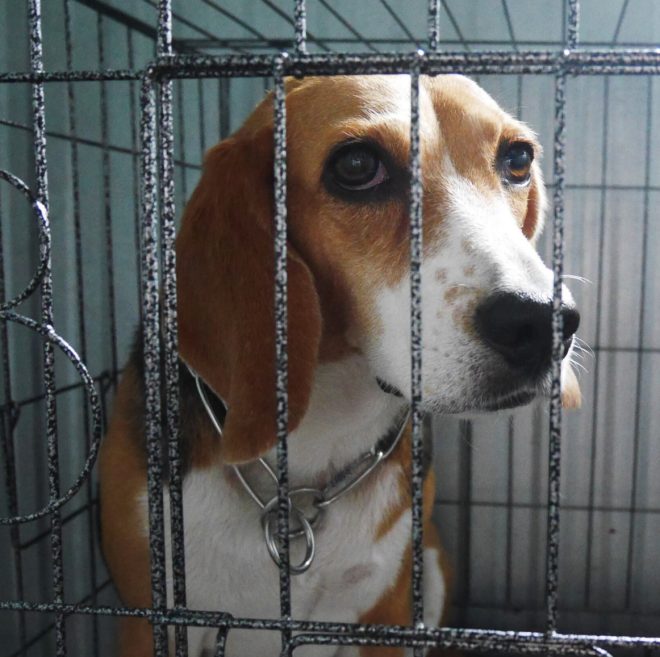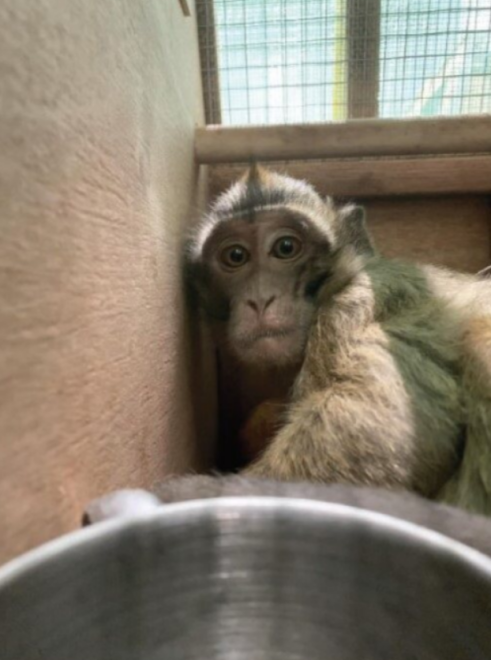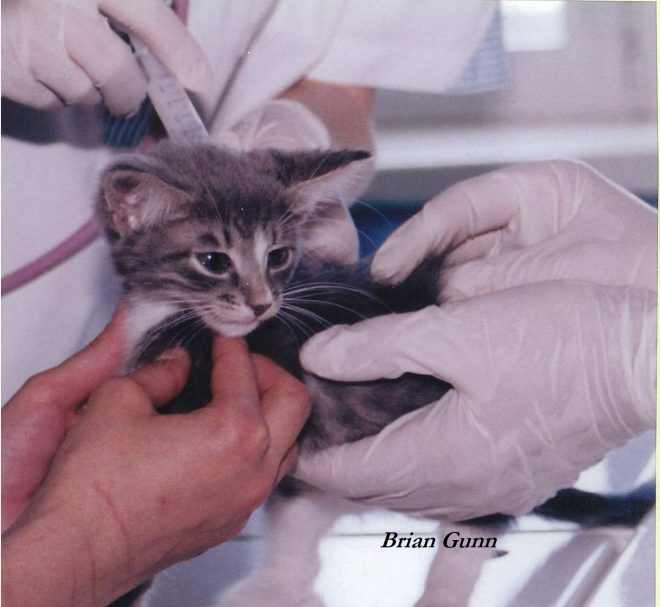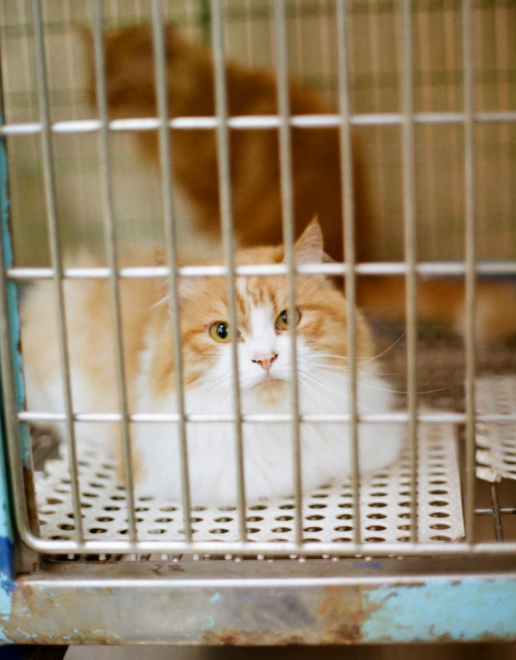
Today we recognize World Day for Animals in Labs. Instituted in 1979, this day and the associated Animals in Labs Week have been a catalyst for the movement to end the suffering of animals in laboratories and replace them with humane, modern science.
It is a day to reflect on the millions of animals who endure pain and death behind laboratory doors, and to strengthen our resolve to fight for change. Animal Alliance of Canada joins this global call – urging compassion, transparency, and an end to cruel animal experimentation. As demonstrated by our successful campaign to ban cosmetics testing on animals in 2023, when we work together, we can achieve big victories for animals.
The Hidden Suffering of Animals in Laboratories
Most Canadians have little idea what truly happens to animals in research labs — not because they don’t care, but because information is tightly controlled. Although it’s impossible to know the exact number as not all labs are required to report, each year, at least three million animals are used in experiments across Canada, including mice, rabbits, dogs, cats, and primates. They endure everything up to, and including highly invasive procedures, and most are killed when experiments end. Yet the public has little access to where these experiments happen, what is done, or which animals suffer.
One major reason for this secrecy is that Canada has no federal law regulating animal experimentation, making us the only G7 nation without such oversight. Instead, voluntary guidelines are set by the Canadian Council on Animal Care (CCAC) — a body funded by public agencies but operating with little transparency. The CCAC is exempt from Access to Information laws, does not disclose facility names without permission, and covers only institutions that opt in for accreditation. Some private labs operate entirely without external oversight.
Even Ontario’s Animals for Research Act provides limited transparency. The government heavily redacts or denies information requests, including details about shelters supplying lost or stray pets to labs. For families searching for missing pets, this secrecy makes recovery nearly impossible.
What we do know paints a grim picture. Records received through Freedom of Information requests reveal animals living in filthy conditions, injured and killed by faulty equipment and botched procedures, and subjected to experiments using expired drugs. Some were left to suffer severe pain without any anesthetics or analgesics. These are not outdated reports — they are from Canadian labs in recent years. They expose a system where sentient beings are treated as disposable test subjects, with devastating outcomes for the animals and questionable ethical standards of the researchers.

Ethical Issues: Cruel and Unjust Practices
Morally, we must ask whether it is right to inflict such misery on sentient creatures. Increasingly, people in Canada and around the world are answering “no.” Public support for animal testing has been waning over recent decades and with good reason.
One especially heart-wrenching aspect is the use of former companion animals – dogs and cats – in research. Every year, thousands of lost, abandoned, or surrendered pets end up being sold or given to laboratories. Most Canadians would be horrified to learn that the dog or cat they love could meet such a fate. Yet in 2018 alone, over 8,500 dogs and 7,800 cats from shelters across Canada were handed over for use in experiments. In Ontario – one of the largest users of pets for research – 12,104 dogs and 11,575 cats were sent from pounds and shelters to labs over just a five-year period (2012–2016). These numbers represent beloved companions who might have been family pets, suddenly caught up in the worst of circumstances.

How do our pets end up in laboratories? The reality is an opaque, troubling system. Some municipal shelters sell unclaimed dogs and cats to research after a legally mandated holding period. Others may deem animals as “donated” by their guardians – a category so broad it includes stray pets picked up in communities with lax bylaws. In practice, this means if your pet goes missing, there is a chance they could be transferred to a lab before you find them. And because of the secrecy around which shelters and labs participate, guardians often hit a dead end trying to trace a lost animal. It is a cruel irony that places meant to shelter animals can become a pipeline to pain.
Animal Alliance of Canada’s No Pets in Research campaign was created to fight this very injustice. We are working to ban the practice of using lost or surrendered pets in experimentation. In Ontario, we are urging the government to amend the Animals for Research Act to prohibit labs from taking animals from pounds and shelters. Ending the use of pets in research is not only an ethical necessity; it is also a step toward greater accountability in the system as a whole.
Toward Accountability and Humane Science
There is growing interest within the scientific community in phasing out animal testing in certain areas in favour of “New Approach Methods” (modern non-animal research techniques). Indeed the U.S. Food and Drug Administration (FDA) recently released a 3-year roadmap to reducing animal testing in preclinical safety studies, stating “[t]his transition will enhance public health by streamlining drug development and ensuring safer therapies reach patients faster, while positioning FDA as a global leader in modern regulatory science and innovation.” Canada should not lag behind. We need robust laws that at minimum end the cruelties we know are indefensible and we need a plan to reduce and replace the use of animals in science altogether.
The first step is true accountability. Our review of the Canadian Council on Animal Care reveals a troubling reality: this voluntary, opaque system fails to protect animals and protects sloppy scientists. Without enforceable laws, independent inspections, or public transparency, research happens in the shadows. Canadians deserve to know how their tax dollars are being used — and animals deserve meaningful protection.
We also need to invest in non-animal testing methods that provide human-relevant results. Advances like organoids and AI-powered models are delivering faster, more accurate results without harming animals. Canada has the opportunity to lead in ethical science and innovation — but only if we move beyond outdated, inhumane methods.

Take Action Now!
On this World Day for Animals in Labs, we recognize the suffering that has gone on for far too long – but recognition alone is not enough. Each of us can help drive change for animals in laboratories.
Animal Alliance of Canada urges you to take action in the following ways:
- Donate – Support our efforts to end cruel and unnecessary animal experimentation by making a donation to Animal Alliance of Canada. We are a non-profit organization, and your gift directly fuels campaigns like No Pets in Research and our work to push for legislative change. Every dollar helps us fight for the animals who cannot speak for themselves.
- Spread the Word – Share this message with friends, family, and on social media. Public awareness is a powerful force. Many people simply do not know that millions of animals suffer in labs, or that even lost pets can end up as test subjects. By educating others, you help build the public pressure needed to reform this system.
- Demand Change – Contact your elected officials at the federal and provincial levels. Let them know that Canadians care about animals exploited in labs and want stronger laws. Ask for transparent oversight of all animal research, an end to the use of shelter pets in experiments, and increased funding for non-animal research methods. When voters speak out for animals, policymakers will listen.
Together, we can honor the lives of animals who have suffered in laboratories by ensuring that they are not forgotten and that future generations of animals will not endure the same fate. World Day for Animals in Labs is a day of remembrance, but also of action and hope. By supporting organizations like Animal Alliance of Canada and by using our voices, we affirm that compassion and science can go hand in hand.
Let us work toward a Canada – and a world – where no animal is tormented for research, where our best science is humane science, and where transparency and accountability replace secrecy and suffering. On this day of awareness, and every day forward, stand with us in saying “no” to animal cruelty in labs and “yes” to a more ethical future. The animals in laboratories cannot plead for their own lives, but we can and must speak up on their behalf.
Together, we will demand the change that is long overdue – and with your help, we will save lives.